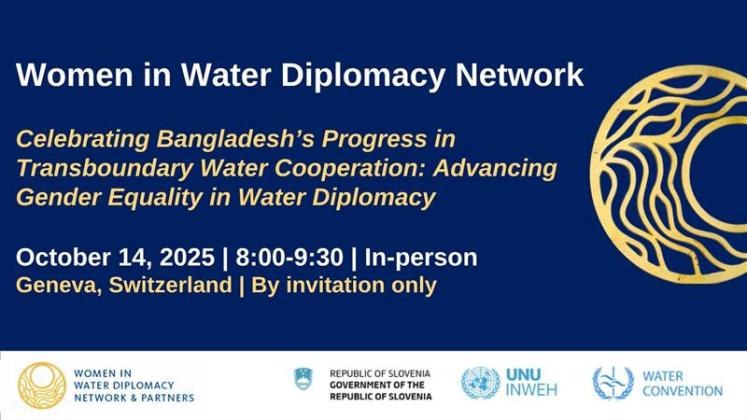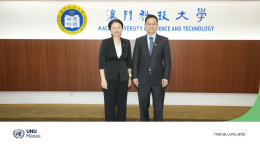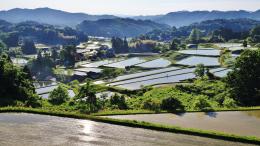Water insecurity is intensifying in conflict-ridden and unequal regions, pushing transboundary rivers toward critical thresholds and disproportionately impacting vulnerable groups like women, youth, and communities. Women water diplomats and experts lead cooperative, inclusive governance efforts in high-risk areas, yet they remain severely underrepresented in water and climate decision-making. Women's full participation in development and peacebuilding is vital for resilient, peaceful futures, with sustainable water access as a cornerstone. Inclusive processes are more strategic and effective: research shows that women’s involvement increases the durability of peace agreements, amplifies community and youth priorities, strengthens gender-sensitive provisions, and bridges divides across conflicts — despite women’s historical exclusion from formal decision-making spaces.
On the margins of the 6th Joint Meeting of the Working Group on Integrated Water Resources Management and the Working Group on Monitoring and Assessment of the UNECE Water Convention (13–15 October 2025) in Geneva, Switzerland, The Women in Water Diplomacy Network (WWDN), with the support of the Government of Slovenia, the United Nations University Institute for Water, Environment and Health (UNU-INWEH), and the Water Convention, will convene a high-level meeting in Geneva on 14 October 2025 to celebrate Bangladesh’s progress in transboundary water cooperation and to advance the agenda for gender equality in water diplomacy.
The event will feature the Honourable Rizwana Hasan, Adviser to the interim Government of Bangladesh and Minister of Environment, Forest and Climate Change, as the Guest of Honour, alongside distinguished representatives of the global water diplomacy community. The event coincides with Bangladesh’s accession to the Water Convention and the announcement of a prospective Twinning Initiative between the Netherlands and Bangladesh.
The event will bring together women water diplomats, decision-makers, and experts to discuss how inclusive leadership and women’s participation support resilient transboundary water governance. Through this dialogue, participants will reflect on reflect on how advancing gender equality in water and climate diplomacy can foster cooperation across borders, strengthen peacebuilding, and ensure water security for all.
- Welcoming remarks by Maria Amakali, Member, Global Leadership Council, Women in Water Diplomacy Network, Namibia), and Ambassador Tanja Miškova, Ambassador-at-Large for Water Diplomacy, Ministry of Foreign and European Affairs, Slovenia
- Keynote speech by Honourable Rizwana Hasan, Adviser to Bangladesh's interim government and Minister of Environment, Forest and Climate Change
- Network introduction and updates by Sogol Jafarzadeh, UNU-INWEH's UN and Government Relations Coordinator, Process Support Team, Women in Water Diplomacy Network
- Water Convention overview and gender opportunities by Sonja Koeppel, Secretary, Water Convention, UNECE
- Slovenia's experiences by Aleš Bizjak, Ministry of Natural Resources and Spatial Planning, Slovenia; Chair, Water Convention Bureau
- Tour de table with participant reflections on gender equality, cooperation, peacebuilding, and water security.
- Closing remarks by Prof. Kaveh Madani, UNU-INWEH Director
About The Women in Water Diplomacy Network (WWDN)
The Women in Water Diplomacy Network (WWDN), founded in the Nile Basin in 2017, is a global community of women leaders and allies with expertise in shared waters and water-insecure, conflict-sensitive regions. It strengthens women’s leadership in transboundary water decision-making with support from partners and member communities across the Nile, Central Asia–Afghanistan, Southern Africa, North America, and the South Caucasus. WWDN is guided by its Global Strategy: A Path Forward for Women, Water, Peace and Security, Handbook (2025, First Edition), and Global Leadership Council, supported by its Process Support Team and partners.





